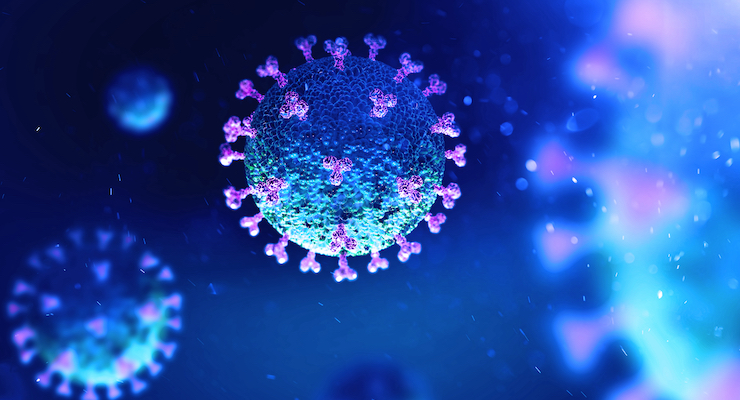Probiotic Formula Shown to Benefit COVID-19 Outpatients with Mild Symptoms
01.12.22
Kaneka Group/AB-Biotics' AB21 was associated with reduction of viral load, duration of symptoms, and rate of remission in a study conducted in 2020.
Supplementation with a probiotic formulation from Kaneka Group and AB-Biotics called AB21 was associated with statistically significant improvements in viral load, duration of symptoms, and rates of remission in a population of COVID-19 outpatients with mild symptoms, according to a new study published in Gut Microbes.
Of 300 patients randomized, 293 completed the study between Aug. 26 and Dec. 10, 2020 and were available for primary analysis (before the emergence of delta and omicron variants). The investigators administered a once-daily supplement for 30 days to the patients which consisted of three Lactiplantibacillus plantarum strains (KABP022, KABP023, and KABP033), and a Pediococcus acidilactici strain called KABP021. They theorized that these strains could have an impact on prognosis of the disease due to their activities on the gut-lung axis (GLA), a general term for the cross-talk between intestinal and pulmonary tissues via the microbiome and immune cells.
Beyond the specific clinical endpoints, the authors of the study also evaluated probiotics’ influence on nasopharyngeal and serum biomarkers, as well as fecal microbiome. A total of 293 patients were randomized to receive either the treatment or the placebo, in a double-blind design.
After receiving the intervention for 30 days, complete remission was achieved in 53.1% of patients who took the probiotic formulation, compared to 28.1% of the placebo group. The probiotic supplementation was also linked to reductions in nasopharyngeal viral loads on days 15 and 30 compared to baseline, lung infiltrates (which "seemed to occur earlier during the intervention"), and the duration of digestive and non-digestive symptoms compared to the placebo group, and the intervention was well-tolerated.
Further, the investigators noted a significantly increased production of IgM and IgG antibodies against SARS-CoV2, the virus which causes COVID-19, in those who were administered probiotics. Based on this, the authors suggested that the potential mechanism of action behind the probiotic users’ benefits had been on the immune system, rather than through alterations of colonic microbiota composition. Nonetheless, the study was observational in nature, and no mechanism of action could be established.
Additionally, the authors noted some limitations in the study. First, all subjects in the study were of Hispanic ethnicity and were recruited in a single center. Additionally, no patients over 60 years old were recruited for the study, warranting additional studies in older populations. Additionally, no infections requiring hospitalization or ICU admission, or resulting in death, occurred in the study. "Thus, the usefulness of this probiotic on preventing COVID-19 aggravation or death could not be directly assessed," the authors wrote.
“The positive findings reported by this study are an important step forward in our continued efforts to support COVID-19 patients,” Pedro Gutiérrez-Castrellón, MD, lead author of the study, said. “Few trials to date have found effective approaches for reducing symptom duration and viral load in COVID-19 outpatients. Therefore an oral probiotic that helps to reduce viral load, lung infiltrates, and symptom duration – like the AB21 probiotic intervention trialed in this study – could help support COVID-19 outpatients more cost-effectively, and in addition to standard recognized therapies.”
Of 300 patients randomized, 293 completed the study between Aug. 26 and Dec. 10, 2020 and were available for primary analysis (before the emergence of delta and omicron variants). The investigators administered a once-daily supplement for 30 days to the patients which consisted of three Lactiplantibacillus plantarum strains (KABP022, KABP023, and KABP033), and a Pediococcus acidilactici strain called KABP021. They theorized that these strains could have an impact on prognosis of the disease due to their activities on the gut-lung axis (GLA), a general term for the cross-talk between intestinal and pulmonary tissues via the microbiome and immune cells.
Beyond the specific clinical endpoints, the authors of the study also evaluated probiotics’ influence on nasopharyngeal and serum biomarkers, as well as fecal microbiome. A total of 293 patients were randomized to receive either the treatment or the placebo, in a double-blind design.
After receiving the intervention for 30 days, complete remission was achieved in 53.1% of patients who took the probiotic formulation, compared to 28.1% of the placebo group. The probiotic supplementation was also linked to reductions in nasopharyngeal viral loads on days 15 and 30 compared to baseline, lung infiltrates (which "seemed to occur earlier during the intervention"), and the duration of digestive and non-digestive symptoms compared to the placebo group, and the intervention was well-tolerated.
Further, the investigators noted a significantly increased production of IgM and IgG antibodies against SARS-CoV2, the virus which causes COVID-19, in those who were administered probiotics. Based on this, the authors suggested that the potential mechanism of action behind the probiotic users’ benefits had been on the immune system, rather than through alterations of colonic microbiota composition. Nonetheless, the study was observational in nature, and no mechanism of action could be established.
Additionally, the authors noted some limitations in the study. First, all subjects in the study were of Hispanic ethnicity and were recruited in a single center. Additionally, no patients over 60 years old were recruited for the study, warranting additional studies in older populations. Additionally, no infections requiring hospitalization or ICU admission, or resulting in death, occurred in the study. "Thus, the usefulness of this probiotic on preventing COVID-19 aggravation or death could not be directly assessed," the authors wrote.
“The positive findings reported by this study are an important step forward in our continued efforts to support COVID-19 patients,” Pedro Gutiérrez-Castrellón, MD, lead author of the study, said. “Few trials to date have found effective approaches for reducing symptom duration and viral load in COVID-19 outpatients. Therefore an oral probiotic that helps to reduce viral load, lung infiltrates, and symptom duration – like the AB21 probiotic intervention trialed in this study – could help support COVID-19 outpatients more cost-effectively, and in addition to standard recognized therapies.”













